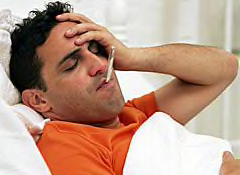Sign In

Menu
Suggested Searches
Recent Searches
Suggested Searches
Product Ratings
Resources
Chat With AskCR
Resources
All Products A-ZThe payment for your account couldn't be processed or you've canceled your account with us.
Re-activateMy account
Sign In
My account
Sign In


Got a fever, headache, and muscle aches? If you're almost anywhere on the planet other than West Africa, it's far, far more likely to be the flu than Ebola. But the early signs of Ebola are very similar to flu symptoms. So to avoid confusion and unnecessary concern—for you and for health care workers—it's a good idea to do all that you can to avoid the flu. That means getting vaccinated now.
"It may be irrational, but given the news about Ebola, it's easy to understand why anyone with flu-like symptoms would be worried," Consumer Reports medical adviser Orly Avitzur, M.D., said. "Getting a flu shot could give you peace of mind, and also relieve the burden on doctors offices and emergency rooms responding to worried patients.
Of course, getting a flu shot is a good idea for other reasons, too. The flu kills thousands of Americans each year (far more than Ebola is likely to in the U.S.), and causes debilitating illness in many more.
See our advice on how to prevent and treat the flu, including our advice on flu vaccines.
And since the flu shot reduces, but does not eliminate, your risk of getting the disease, you should take other flu-protective measures, including:
—Joel Keehn
 Build & Buy Car Buying Service
Build & Buy Car Buying Service
Save thousands off MSRP with upfront dealer pricing information and a transparent car buying experience.
 Get Ratings on the go and compare
Get Ratings on the go and compare
while you shop